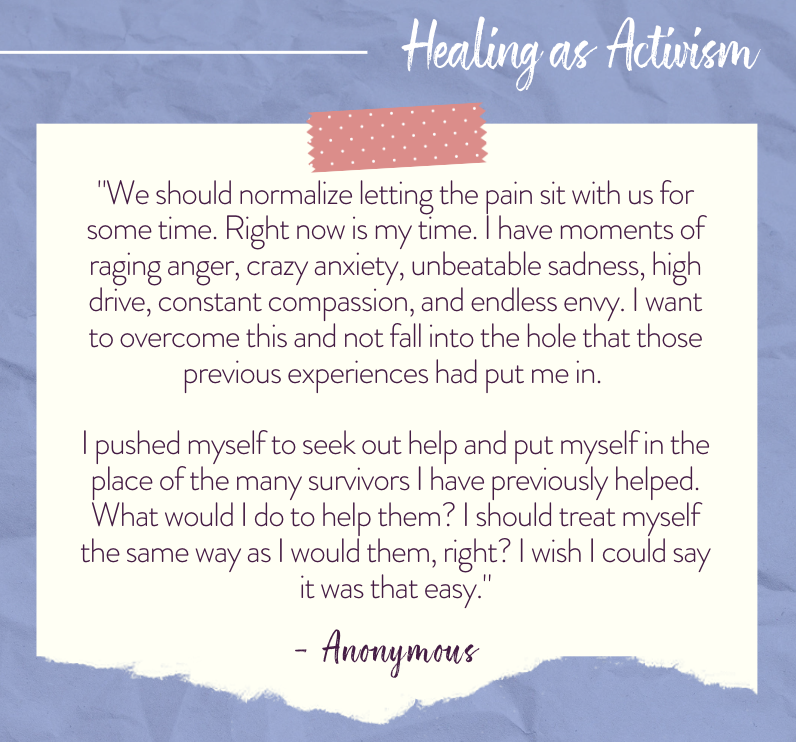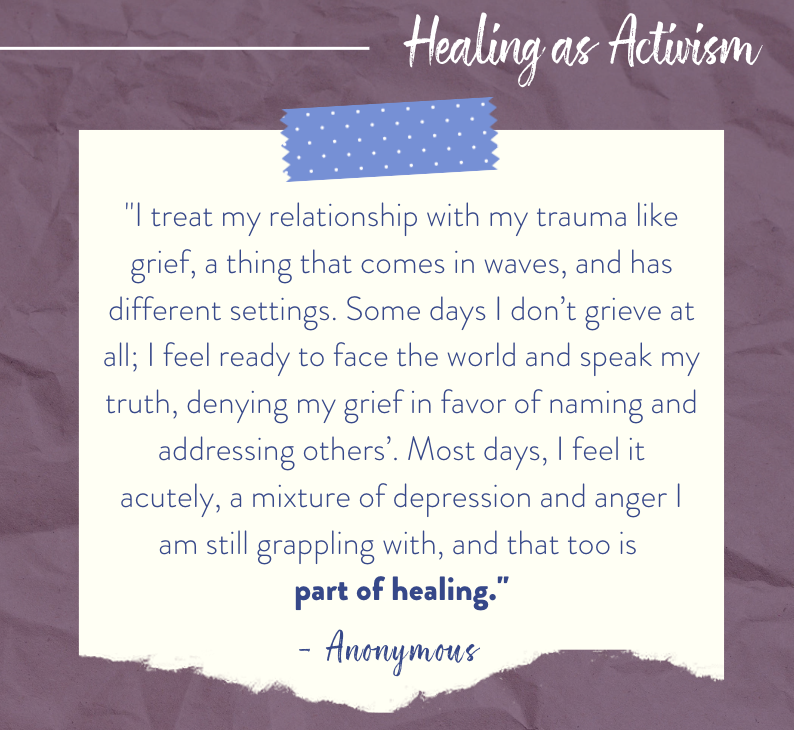Reflecting on Sahiyo’s Healing as Activism Campaign

This past month, Sahiyo hosted a social media campaign, ‘Healing as Activism’, to honor the 16 Days of Activism to End Gender Based Violence. From November 25th to December 10th, we shared the stories of FGC survivors in their journey towards healing. We received 16 submissions from survivors located around the world, and they shared their journey in various formats, including videos and blogs. We also highlighted a recent Dear Maasi blog exploring the role of confronting the person who cut you. Overall, the goal of this campaign was to break the stigma around discussions of mental health that often impact survivors’ abilities to heal by amplifying stories of those who are on the journey towards healing. To learn more, follow us @SahiyoVoices across social media platforms! Read blogs from the Healing as Activism Campaign here.
Healing as Activism: Finding my way out of the darkness

By Anonymous It has only been a little over 2 weeks since I learned what female genital mutilation (FGM) was. It has only been a little over 2 weeks since I learned that I’ve been through FGM. I am 24 years old, involved in a community that practices FGM, yet is so secretive about its practices. I have gone 24 years of my life unaware of the severity of this issue, among my own community and many others around the world. When I found out, my mind went into pure chaos. I was told about the FGM by a friend who was talking about the issue freely to me, when I stopped her mid-explanation, saying I had no idea what she was even talking about. Shocked, she explained the true purpose behind the practice, and how so many of her close friends had undergone this procedure. The memories came flooding back. I started making connections to my confusion when I was only 7 years old, secretly being told by my mother we have to do this for the safety of my health, but I can never talk about it again. As a child, fully in the protection and care of my parents, I agreed and suppressed the experience because it was what I was told to do. Until this moment was when I realized this confusing, painful and suppressed experience was FGM. It has only been a few weeks since the experience, and I threw myself into research to better help me cope. I needed to know everything I could about this. I confronted my parents about the experience and just left with more questions and pain. I think why it drove me so crazy is because of my background. I have been a part of countless movements and organizations supporting survivors and victims of sexual violence for over 6 years now. I have organized events, workshops, table events, and worked hundreds of hours as a medical advocate and hotline volunteer for these organizations to this day. I’ve helped other survivors through their own experiences. It took me years to grow to fully accept my identity as a young woman who was part of this community. To build my love and appreciation for who I am as a minority in a white majority world. And for the past few weeks, it feels as if all of this was wiped away by one knick. All the progress I made to overcome the worst of the worst, constant discrimination because of my minority identity and my own sexual assault in college, all feels faded. I feel lost. How could I have missed this? How did my parents, knowing very well everything that I have been through, not tell me? I wish I had a happy ending to share from this experience, but my story is not over. We should normalize letting the pain sit with us for some time. Right now is my time. I have moments of raging anger, crazy anxiety, unbeatable sadness, high drive, constant compassion, and endless envy. I want to overcome this and not fall into the hole that those previous experiences had put me in. I pushed myself to seek out help and put myself in the place of the many survivors I have previously helped. What would I do to help them? I should treat myself the same way as I would them, right? I wish I could say it was that easy. And I do think one day it will get easier. Right now, there are more bad days than good, but if anything my past experiences have given me endless tools to do something I didn’t before: to fight back. I know it will take time to beat the chaos and to really process this. And I’m taking the steps to get there, something I can’t say I did quickly before this. I have an amazing support system, friends with similar experiences, an amazing therapist, and involvement in organizations that have given me the tools to fight back. Sahiyo has really provided a great community to let me know I am not alone in this experience. This time I’m letting the chaos drive me, not beat me.
Healing as Activism: One cannot give from an empty cup

By Anonymous Emotional burnout looms over my head like my very own Sword of Damocles, waiting to strike me down for being woefully human. But the above saying travels with me, like my shield against self-doubt, offering ownership of my humanity, acceptance, and assurance that it is okay to be tired, okay to rest. The simple fact is this: one cannot give of themselves, their time or their talents, without taking too — taking time for themselves, taking care of themselves. I joined Sahiyo because of a trauma. Female genital mutilation/cutting (FGM/C) and my experience with it has irrevocably marked my psyche and I will never escape those consequences. Initially, when I joined on as a volunteer, I did so because I thought activism was healing. Turns out, the opposite is more true. Activism is work. Healing from trauma is also work. Sometimes that work can be done simultaneously, but other times one must be paused to further the other. And that’s okay. As an activist, I like to think of myself as an advocate for persons known and unknown, a voice for those not quite ready to speak up — and those who cannot speak at all anymore. But who speaks for me? Who speaks when my voice is torn apart from speaking too much? Who will see me struggling to be heard and say what I can’t? One cannot give from an empty cup. Without taking time for my own mental health, without addressing my trauma, emotional burnout would have been a permanent condition. I treat my relationship with my trauma like grief, a thing that comes in waves, and has different settings. Some days I don’t grieve at all; I feel ready to face the world and speak my truth, denying my grief in favor of naming and addressing others’. Most days, I feel it acutely, a mixture of depression and anger I am still grappling with, and that too is part of healing. I find it important to name the grief, what I am feeling, and let it exist. Honor it as a friend that will, eventually, hopefully, one day leave my presence — even temporarily — so that I can make room for action again. Sometimes that honor takes the form of writing: in creating a fictional world that I control the outcome of, or in journaling, so that I can name my emotions for when I next get a chance to talk with my therapist. It may sound trite, or even potentially immature, but there is so much healing in something as simple as writing fanfiction, in creating a story with a character that is absolutely a version of myself that gets to live in a fictional world I love. That character may have faced the same trauma as me, but the questions they — and I — grapple with have easier answers in the fictional world I get to control. It’s the answers I want to hear to the questions I am a little afraid to ask aloud. Other times, that honor takes the form of community, of being with others who understand, and candidly naming the emotions we are feeling. Being with other members of Sahiyo, even for small periods of time, is a form of healing I didn’t realize I needed until I joined the 2022 Activists’ Retreat and really processed that I was not alone in what I felt. Just like activism, healing does not have to be done solo. Other times still, it is about escaping, about finding something that lets me be unplugged from it all. Turning off my notifications and disappearing into a new craft project; watching a show that I know makes me happy; resetting my thoughts and getting a good night’s sleep because tomorrow will still be there, waiting to arrive, and the work will still be there, waiting to get done, and the journey does not always have to be about moving forward. Sometimes, it can be about resting. One cannot give from an empty cup. I cannot give my time or energy to Sahiyo without first dedicating time and energy to myself. The greatest lesson I have learned on my healing journey is that I must be my greatest advocate, must learn when I need to step back and lean on the love of friends and family to refill my cup so that I can give again. Without taking steps to care for yourself, it becomes harder and harder to care for others. Choose activities that honor your talents and your interests. Choose people who will support you, will speak for you when you are tired. Your cup may never runneth over, but it doesn’t have to run dry in the service of others either.
